I've baked many loaves of the Basic Country Bread out of the Tartine Bread book and they have all come out very good to great. Many friends and family members have told me it's their favorite of all the breads I bake. So I decided to try the Tartine baguette, and my expectations were very high. Either I screwed up (a distinct possibility) or this recipe/formula has some issues. First of all, it makes a huge batch of dough. The directions say to form it into two or three loaves. Perhaps if I had a commercial oven and could make 24 inch baguettes, three would be the right number of loaves, but limited by a 16 inch baking stone, my loaves are not what one would consider to be proper baguettes.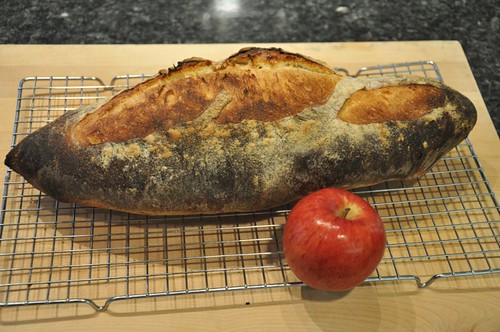 The timing and manner of the salt addition is also a bit awkward. About 40 minutes into the bulk fermentation you are directed to add the salt when you do the first S&F. I didn't think the salt got incorporated very uniformly.
The timing and manner of the salt addition is also a bit awkward. About 40 minutes into the bulk fermentation you are directed to add the salt when you do the first S&F. I didn't think the salt got incorporated very uniformly.
The loaves proofed up like balloons in the Macy*s parade and exhibited prodigious oven spring (I use Sylvia's wet towel steaming technique).
The loaves came out of the oven looking like edible zeppelins. The crumb was not as airy as I would have expected, but that is probably my failing.
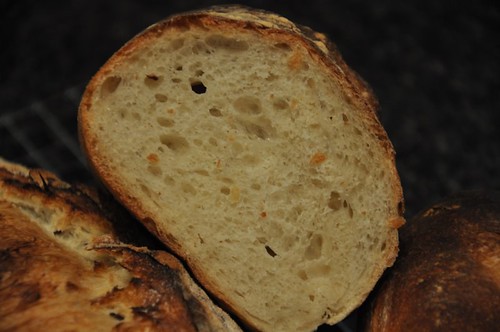 As for the eating - Tasty, but not the best baguette I've eaten by a long shot. These are my baguettes a l'ancienne, which are of proper size and are much tastier:
As for the eating - Tasty, but not the best baguette I've eaten by a long shot. These are my baguettes a l'ancienne, which are of proper size and are much tastier: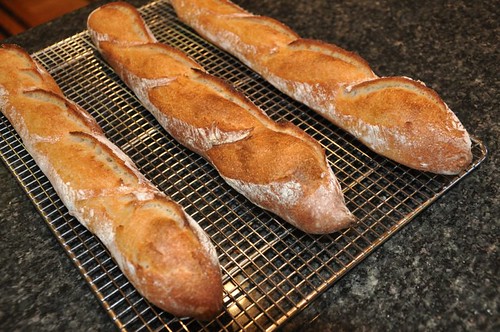 To be fair, the crust is very good; thin and crackling. You should have heard how it sang when it first came out of the oven.
To be fair, the crust is very good; thin and crackling. You should have heard how it sang when it first came out of the oven.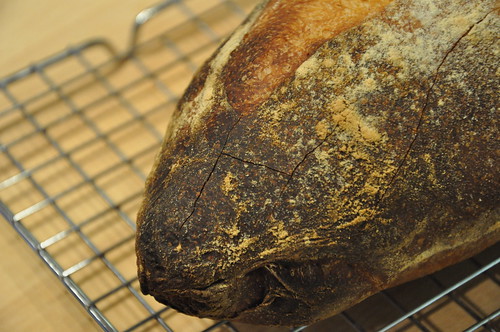
Has anyone else made this Tartine baguette?
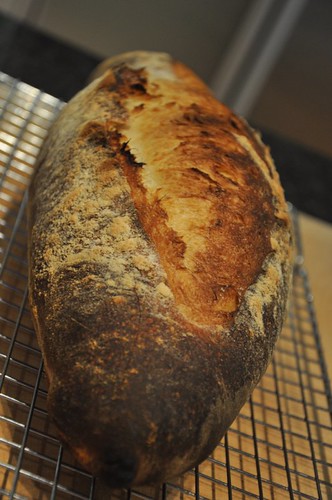
I don't know a thing about tartine bread but those baguettes look excellent. I'm jealous.
You nailed the color on the Tartine "baguette", it looks just like Chad's. I'm not sure why you didn't divide the dough in three or four pieces to shape them into baguettes as you did with your own baguettes.
I've made them twice now and the second time the crumb came out more open than yours. I agree that the taste was not transcedental but I'll have to go buy one from Tartine and check it out. I've only tasted his rustic country loaf which is incredibly good.
As for adding the salt at the end, his rustic country loaf recipe also mentions to add the salt after the autolyse, not surprisingly.
I think you should give them a second chance...
Thanks Cachi. I did divide the dough - I made three baguettes. The photo with the apple is only one of them. I put the apple in the photo to show the size of just one of the three. I will try them again at some point, just not likely my next bake. Interestingly, the flavor today is better than yesterday (the day they were baked). I find that happens often with breads baked with leaven.
Judging by the length of your tartine baguette I would say you need to adjust the quantity of dough in your shaped rise. The recipe in the book mentions that the baguettes are very long and that you should adjust to fit your oven.
When I made the baguettes in a fairly standard home oven I had to split the quantities in half, which would have made 6 loafs instead of the 3(I kept 1/3rd aside to make english muffins -- which were AMAZING!)
Spectacular Looking Baguettes, Sjadad! Such a wonderful color!
So you know you are not alone, I had the very same problem. Mine looked much like yours. What recipe do you use for your lovely baguettes a l'ancienne?
It is DonD's recipe http://www.thefreshloaf.com/node/17415/baguettes-l039ancienne-cold-retardation The flavor is superior to any other baguette I've ever made. It's my wife's favorite. I'll make the Tartine baguette again, but I'll make six loaves instead of three from the same amount of dough.
Too much yeast? The poolish has the equivalent of a full teaspoon while I'm used to using 1/4 teaspoon or less (often much less). I also got the big puffy loaves with a crackly thin crust that was almost like the bread used for bahn mi, and not a whole lot of flavor. Prior to that I had made the Country Loaf from Tartine with fantastic results.
Chad's explanation of his recipe testing procedure indicates these recipes evolved quite a bit and may be quite different from the preps in the bakery, so I would not be surprised if some adjustment is required. Next time I'm going to use less yeast and retard overnight.
Hi,
The Country bread is the best recipe I've tried at home, but I've also had some troubles with the baguettes. I think the recipe has not been as thoroughly tested; some of the steps are not detailled and a bit confusing. Otherwise, I agree that there is too much yeast in the recipe. If you use instant yeast, I think the right amount is between 1.5 and 2g. If I want the baguettes to fit in my kitchen oven, I also have to make 7-8 of them with the recipe.
This was my first attempt at making baguettes (quite a challenge!) so maybe I'll try a different recipe next time.
Hi,
This comes, I know a while after the discussion began and everyone may have moved on already - however..
I made bread using the Tartine baguette method this weekend and was prety pleased with the result; though more a batard than baguette really. I have a small oven. Planning on taking pictures but all eaten.
I am curious if anyone has in this technique, held back say 50 gms of water to add to the salt to assist it to disolve in the dough? I used Malden sea salt, which I ground finely, but this seemed to have chrystaline quality right through the bulk fermentation. so was wondering if this idea might work?
any thoughts?
best
Tim
I have held back some of the water to dissolve the salt called for in a number of bread recipes. Lately I've been using fine sea salt so I don't need to worry about large salt crystals not dissolving.
Sjadad
many thanks - i'll be giving this a go,
best
Tim
Yeah that what I do with all my bread. 25-50g of water left out to mix with the salt. I usually use boiling water as well to assist in dissolving the salt.
I don't recall the recipe saying to add the salt after mixing? With doughs like this I typically add the salt in the beginning and that's what I've been doing with these. I lessened the amount of poolish & starter just a little bit to draw out the bulk fermentation. I bake demi-baguettes @ 150g each & then a couple of larger ones at approx. 300g each. I do have access to a large wood-fired hearth oven (with a gas option that makes mornings sooooo easy). It's taken me time to get these down but it's really working out nicely for me these days!
A big difference here is whether you use active dry yeast or instant yeast. In my experience is better to use active yeast, but if you only have instant use 25% (0.75 g). Otherwise you get huge loafs. Also, I save some water to add the salt before folding after an autolyse. For home oven the recipe makes 5-6 loafs.
I came to the Forum to see if anyone had reviewed the Tartine baguette recipe... and this 10 year old thread did not disappoint! I had the same exact questions about the addition of salt and the size of the loaves! If I do this recipe again I will withhold some water to make a salt slurry, and divide into smaller loaves. I'm not sure about the flavor, as some other posters also mentioned. I might prefer 100% sourdough baguette. Yeasted doughs no longer taste flavorful to me! But I will see how the baguettes taste tomorrow...